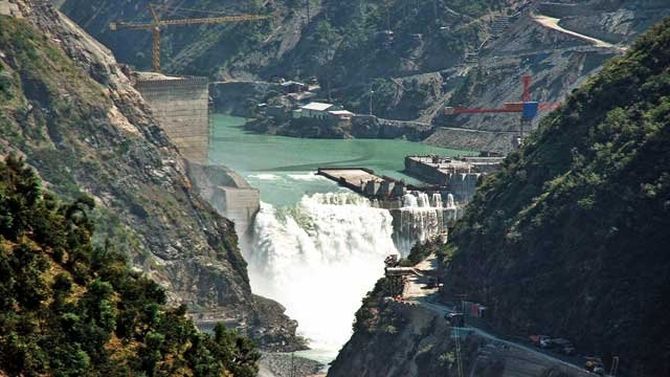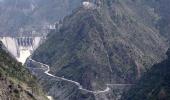
India has decided to 'stop' the flow of its share of water to Pakistan from rivers under the Indus Water Treaty, Union minister Nitin Gadkari said on Thursday, in comments that came over a week after the ghastly Pulwama terror attack killing 41 Central Reserve Police Force personnel.
An official later clarified that it was not a 'new decision' and that the Water Resources minister was 'simply reiterating' what he has always said.
'Under the leadership of Hon'ble PM Sri @narendramodi ji, Our Govt. has decided to stop our share of water which used to flow to Pakistan. We will divert water from Eastern rivers and supply it to our people in Jammu and Kashmir and Punjab,' Gadkari tweeted.
The reiteration to stop the flow of Indus water to Pakistan comes amid mounting Indo-Pak tension over the Pulwama terror strike that has triggered demands for action against the neighbouring country.
India has already decided to revoke the Most Favoured Nation status to Pakistan and mounted a diplomatic offensive to isolate it in the international community.
"Regarding the tweet (by Gadkari) about Indus treaty, this is not a new decision. Mantriji is simply reiterating what he has always said.
"He is talking about diverting India's share of Indus water which was going to Pakistan -- and he has always been saying this," Information Officer in-charge of Water Resources Ministry Neeta Prasad said when asked about the issue.
There were demands to stop flow of India's share of Indus water to Pakistan after the Uri terror attack in 2016.
Officials said the actual implementation of the decision may take up to six years as dams as high as 100 metres will have to be built to stop flow of water.
Under the Indus Water Treaty signed in 1960, the waters of the western rivers -- the Indus, Jhelum, and Chenab -- was given to Pakistan and those of the eastern rivers -- the Ravi, Beas, and Sutlej -- to India.
India's share of water from Ravi, Beas and Sutlej rivers came to 33 million acres feet (MAF). While about 95 per cent of the water was being used in the country after the construction of three main dams across the rivers, close to 5 per cent water or 1.6 MAF would flow to Pakistan.
To gain access to this water, India is now building more dams which will be completed in six years, officials said.
In another tweet, Gadkari said, 'The construction of dam has started at Shahpur-Kandi on Ravi river.
'Moreover, UJH project will store our share of water for use in J&K and the balance water will flow from 2nd Ravi-BEAS Link to provide water to other basin states.'
In an address at a public rally at Baghpat in Uttar Pradesh on Wednesday, Gadkari said, "We have started the work of purification of river Yamuna ..."
"After the formation of India and Pakistan, Pakistan got three rivers, and India got three rivers. The rightful water of our three rivers was flowing to Pakistan."
"Now we will build three projects on them, and divert the water to river Yamuna," he said.
The Union cabinet in December had approved the Shahpurkandi dam project on the Ravi river in Punjab, a move that was intended to help India arrest its share of water flowing into Pakistan.
For this, a central assistance of Rs 485.38 crore for irrigation component over five years from 2018-19 to 2022-23 was also announced.
In September 2018, the Punjab and the Jammu and Kashmir governments had signed an agreement to resume works on the Rs 2,793-crore Shahpur-Kandi project, according to officials.
Though the work on the project began in 2013, it was halted due to certain issues raised by J-K.









